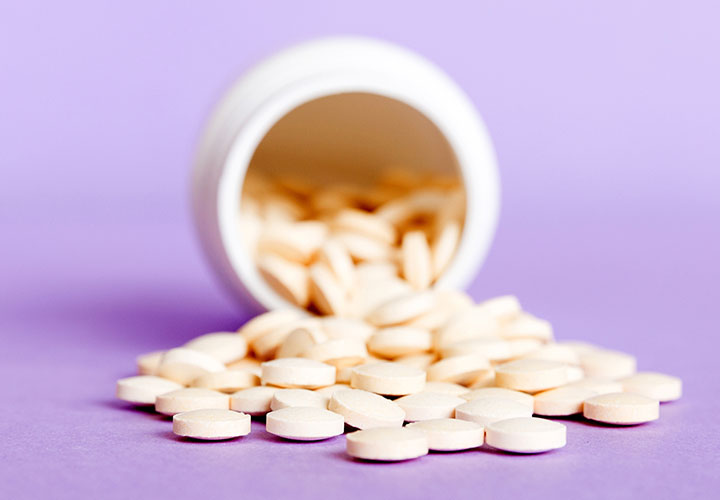
Experts Share 5 Supplements That Can Promote Hydrated Skin, Healthier Hair And Stronger Nails
1. L-lysine
L-Lysine is an amino acid that is a primary building block of collagen, Dorn says. He notes that the body requires up to 2-3 grams a day for “optimal collagen synthesis,” an amount that is difficult to obtain from diet alone.
“As important as collagen is, I do not recommend taking a typical collagen supplement,” Dorn says, as most collagen supplements on the market come from animals, which “not only often contain the numerous toxins that industrial agriculture animals are fed,” but are also “very difficult” for the body to use.
The collagen molecule, in its whole form, is an extremely large molecule that the body cannot effectively break down and utilize, he continues, as he finds it “far more effective to take the specific nutrients,” like l-lysine, that allow your body to generate its own collagen naturally, “as it always has.”
2. L-Proline
L-Proline is another amino acid that is also an essential component of collagen and the elastin fibers that support connective tissue, Dorn says.
“L-Proline works in concert with L-Lysine to synthesize collagen, and collagen synthesis requires 1000mg of proline, which like L-Lysine, can be a difficult amount to obtain from diet.” As you’re probably already aware, collagen is the most abundant protein in the body, accounting for nearly one-third of its protein composition. Collagen, Dorn adds, gives skin the ability to move, stretch and rebound into shape, and this is known as skin elasticity.
“Collagen is not just in the skin, but in our glands, organs, bones, heart valves, brain, liver and lungs as well,” Dorn says. Unfortunately, he continues, after the age of 30, “collagen levels in the body drop 1-2 percent each year, and by age 45 the average person has already lost up to 30%,” leading to wrinkles and a loss of skin elasticity.
With that said, taking supplements like L-Proline help you “take the precursors and building blocks that allow your body to synthesize its own collagen,” Dorn stresses, so you can “naturally produce collagen daily and your skin health will improve significantly because of it,” taking on a more tone and firm appearance.
3. Vitamin A
According to Qazi, the optimal daily vitamin for women aged 40 and above seeking to firm up their skin and mitigate the signs of aging is unequivocally vitamin A. He says that whether taken orally with a supplement or applied directly to your skin with a cream or serum, "Vitamin A is effective at lessening the appearance of age."
"Vitamin A stimulates collagen production and elastin formation, even after they start to break down, rebuilding and repairing what was lost," Qazi explains. "If you think of your skin like a trampoline, the collagen would be the frame, and the elastin would be the springs that make the trampoline bouncy," he adds. "Without the frame and springs, the trampoline is just some rumpled canvas on the ground." Luckily, your skin doesn't have to lose the frame or the springs when you add vitamin A into your daily routine!
4. Vitamin E
Another helpful supplement for a more glowing, supple and radiant complexion is vitamin E, Best says. "Vitamin E is naturally produced by the sebum which is emitted through the pores on the skin," she explains.
"This vitamin is oily and keeps the skin healthy, vibrant, and firm. Those with dry skin do not produce adequate amounts of vitamin E, leading to wrinkles, dark spots, and inflammation." She notes that "adding a vitamin E supplement to your morning regimen is an excellent way to help reduce and prevent wrinkles, including crow's feet."
Best advises that the absorption of vitamin E into the body can be enhanced by pairing it with food containing healthy fats, due to its fat-soluble nature. "For optimal absorption and extra vitamin E, you could add an avocado to your breakfast because it is packed full of healthy fats and vitamin E," she suggests.
5. Zinc
If you struggle with acne and/ or just want to promote clearer, softer and more nourished-looking skin as you age, Zeichner recommends taking zinc supplements. "Zinc has anti-inflammatory properties and has been shown to help calm acne breakouts," he explains.
According to Zeichner, the inclusion of zinc supplements in your skincare regimen aids in the production of fresh, supple skin cells while also serving to mend any cells that may have been impacted by acne. This is particularly useful for individuals who have had acne troubles in the past or currently suffer from it.
The Bottom Line
Overall, while these five supplements are highly regarded by skincare experts, consulting a dermatologist can help you determine the optimal supplement for your unique skincare needs.
For those seeking to age gracefully, these supplements are frequently recommended by physicians and serve as a valuable starting point for supplement options!


